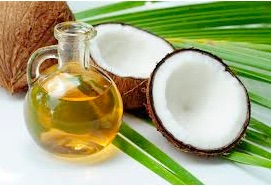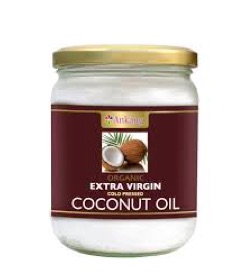
Written By Judy E. Marshel, PhD, RD, CDN
Coconut oil, previously shunned by the health and wellness community for its high saturated fat content, is now a staple cooking oil in many households. It can be found not only in specialty health food stores, but at most local grocers as well.
While many healthy professional tout the benefits, many organizations such as the American Heart Association and the USDA continue to caution consumers against all tropical oils, including coconut oil.
What Is Coconut Oil?
Coconut oil is made up of 100% fat. Yet, the fat in coconut oil differs from the traditional saturated fat often found in animal products, which is primarily comprised of long-chain fatty acids
Coconut oil has an unusually high amount of medium-chain fatty acids or triglycerides (MCFAs or MCTs), which are harder for our bodies to convert into stored fat and easier for them to burn off than long-chain fatty acids or triglycerides (LCFAs or LCTs).
Like all other plant-based oils, it doesn’t contain cholesterol as other animal based sources of saturated fat do.
Not All Coconut Oil is Created Equal

All coconut oils are not created equal.
- Partially hydrogenated coconut oil is just as harmful as other highly processed oils containing trans fat and clearly wreaks havoc on your health.
- Refined coconut oil is extracted from chemically bleached and deodorized coconut meat. This also is not a good choice.
- Virgin coconut oil is extracted from the fruit of fresh mature coconuts without using high temperatures or chemicals, is considered unrefined and may paint an entirely different story for our health. This has the most health benefits.
Possible Health Benefits Of Consuming Coconut Oil
- Antioxidant Properties: According to the Academy of Nutrition and Dietetics, virgin coconut oil has potential antioxidant properties due to certain plant nutrients it contains called phenolic compounds
- Cardiovascular benefits: May help raise both HDL (“good” cholesterol), and LDL (“bad” cholesterol), suggesting that coconut oil intake may be associated with a neutral, if not beneficial, effect on cholesterol levels. Some research suggests it raises HDL, but does not raise LDL.. which is even better! Other oils tend to lower HDL (“good” cholesterol), and raise LDL (“bad” cholesterol),
- Diabetes: May improve glucose tolerance, insulin sensitivity and reduce body fat accumulation.
- Weight loss: May promote loss of abdominal fat. The reason for this is believed to be that the unique structure of the MCT fats in coconut oil make them easier to burn and harder to store in fat tissues compared with the LCFAs found in most other fats, including olive oil.
- Cooking with Coconut Oil. Coconut oil’s fatty acid profile makes it highly stable, protecting it from oxidative and heat damage when heated. Being mostly saturated, it’s an optimal fat for cooking, since the fats aren’t easily damaged by heat. Plus it adds a sweet-nutty coconut flavor and a wonderful aroma.
- Provides antimicrobial properties. Because it contains lauric acid, it can help kill microbes.
- Great moisturizer for skin and hair. It has vitamin E, which is very protective.
- Improves calcium and magnesium absorption in the body. This helps to strengthen your bones and teeth!
Potential Health Risks Of Consuming Coconut Oil
While there is credible evidence suggesting that the link between saturated fats and heart disease may NOT be as strong as we had previously thought, the USDA Dietary Guidelines continue to suggest avoiding saturated fats, including tropical oils like coconut.
The American Heart Association recommends limiting all saturated fats including those from tropical oils without discretion as to whether they contain MCTs.
Other critics of coconut oil insist that the studies being performed are not reliable. They are conducted for short periods of time, the number of study participants are too small, and many of the results stated have not been significant enough to prove any benefit to coconut oil consumption.
The Bottom Line?
Skip food products that contain partially hydrogenated coconut oil. Choose virgin coconut oil and use it in moderation. Use virgin coconut oil to replace other saturated fats in your diet like butter or bacon or other fats, rather than simply adding it to your day. Because of its deep coconut flavor, a small amount goes a long way in soups, curries, fish or adding a lovely tropical flavor to vegetables.
